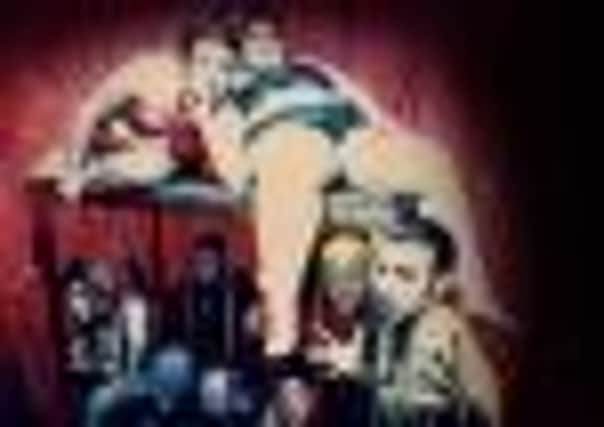Rory Reynolds: Where do we draw the line between art and obscenity?


BUMS on seats has always been the aim of theatre since before Shakespeare, but is relying on shock tactics the best way to do this?
To get people in and then have them leave in droves before the interval is surely defeating the purpose.
Advertisement
Hide AdAdvertisement
Hide AdYet an increasing number of directors such as Edinburgh’s maverick Anthony Neilston are apparently shooting themselves in the foot by sickening audiences to a level where they give productions the bums’ rush.
Neilston’s Marat/Sade – slated for its “filth and depravity”, leading to a mass exodus at the Royal Shakespeare Company in Stratford this week – is by no means the only stage show to get audiences hot under the collar over the years.
Alexander Wedderburn, a retired psychologist and Heriot Watt lecturer, thinks while our own threshold may have changed, the motive has always been the same.
He said: “Whether you’re talking about these plays in the 1960s or now, I don’t think much has changed really. What is publicly frowned upon may have changed, but people go on operating in the ways they always have.
Advertisement
Hide AdAdvertisement
Hide Ad“Perhaps performers and directors do go to greater lengths now to shock but I don’t know if the affect is any greater or lesser than it once was.”
Futz, 1967
Unsurprisingly our first offering centres on the Fringe, but at a time when censorship in the arts remained rife.
The Rochelle Owens production tackled bestiality, and told the story of a farmer who is killed by villagers after a love affair with his beloved sow, Amanda. It outraged the Capital’s genteel theatre-goers.
Edward II, 1969
With Christopher Marlowe’s Edward II, Ian McKellen took on a daring gay role few actors were willing to risk, which involved kissing another man. Local authorities attempted to ban the play and demonstrators lined up to protest. It would be 1988 before McKellen, now Sir Ian, came out.
Jim Rose Circus, 1990s
Advertisement
Hide AdAdvertisement
Hide AdRather than sexual content or blasphemy (that came in the circus’ 2008 return) audience members had to make do with performances of freakish gothic horror, including a man balancing a live lawn mower on his head.
Other highlights included chain saw limbo dancing and the Prince of Pain, who stuck hundreds of needles into his body.
Corpus Christi, 1999
Four years before Jerry Springer: The Opera, this small Edinburgh production caused a storm.
Terry McNally’s play depicts Jesus and his disciples as nightclub-going homosexuals, with the son of God being seduced by Judas Iscariot and later marrying two of his disciples.
Advertisement
Hide AdAdvertisement
Hide AdOn the opening night at the Bedlam Theatre pastor Jack Glass, leader of the Zionist Baptist Church, wore a crown of thorns as he led protests. Fringe boss Paul Gudgin received 128 complaints.
The Age Of Consent, 2001
A fictional production about a 19-year-old convicted for the murder of a toddler, The Age of Consent became infamous as “the James Bulger comedy”.
It was condemned by the two-year-old’s mother for its likeness to the actual crime. The tabloids seized on playwright Peter Morris for penning a bad taste comedy which danced on the memory of the murdered toddler, but was praised by arts critics for its critique of society.
Jerry Springer – The Opera, 2002
With a long history of controversial theatre, it’s no surprise this extreme satire premiered to city audiences before being exported.
Advertisement
Hide AdAdvertisement
Hide AdWith tap dancing Klu Klux Klan, irreverent treatment of Jewish and Christian themes and constant profanity, there was little surprise that the production at The Assembly Rooms sparked anger from religious groups.
When BBC Two screened the play in 2006, it received 55,000 complaints.
XXX, 2004
As our arts critic said at the time, a lot has changed since a young lady cycled across the back of a stage naked in 1962.
The Spanish company La Fura dels Baus attempted Marquis De Sade’s Philosophy of the Bedroom, but much of that was lost to hardcore sex on the stages of The Pleasance. The week after the run ended police in Hamburg launched an investigation into the troupe following displays of graphic sex and bestiality.
Hotel Medea, 2011
Advertisement
Hide AdAdvertisement
Hide AdWhile paling in comparison to others, there’s arguably little stranger than a six-hour theatre “experience” which saw the audience strip and wash the principal cast, before putting them to bed with a cup of cocoa.
Hotel Medea attracted audiences looking to immerse themselves in an all-night show. The production featured characters smearing chocolate on the naked bodies of “dead” cast members.